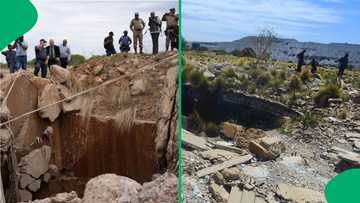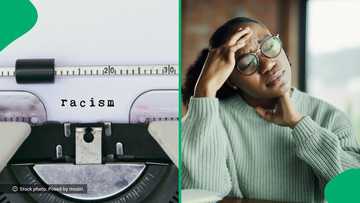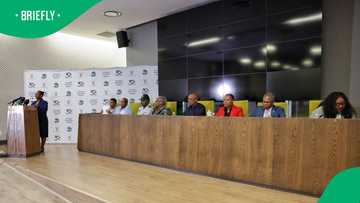Challenges and opportunities for South African GBV victims: A Legal Perspective
Editor's note: Fundisiwe Ntsebesha LLB (UniZulu) LLM (Human Rights Law) (UJ) chats to Briefly News about the challenges, opportunities and support that GBV victims in South Africa have access to.
The Constitution of the Republic of South Africa is the foundation of the country’s legal system and guarantees fundamental human rights, including protections for women and survivors of gender-based violence (GBV).

Source: Original
Key sections of the Constitution that support these rights include:
- Section 12(1)(c): Protects the right to freedom and security, including the right to be free from all forms of violence, whether from public or private sources.
- Section 9 (Equality Clause): Prohibits discrimination based on, gender, race, and other grounds, making it a powerful tool in challenging discriminatory practices and addressing GBV.
- Section 7: Establishes that the Bill of Rights applies to all branches of government and requires the state to protect and promote these rights. This has led to the development of laws and policies to prevent and combat violence against women and children.
Several laws have also been enacted as required by the Constitution to protect survivors of GBV and address domestic violence including the Domestic Violence Act (DVA) No. 116 of 1998, the Criminal Law (Sexual Offenses and Related Matters) Amendment Act No. 32 of 2007 and the Protection from Harassment Act No. 17 of 2011 amongst others.
In addition to laws, the government has implemented policies and initiatives to combat GBV which are:
- National Strategic Plan (NSP) on Gender-Based Violence and Femicide (GBVF): Focuses on prevention, accountability, and support for survivors.
- 16 Days of Activism Campaign: An annual campaign to raise awareness about violence against women and children.
Primary barriers to accessing justice for marginalised groups in Gender-Based Violence crimes
Marginalised groups often lack access to resources and may be unaware of legal mechanisms available to help them seek justice. Economic barriers, such as the high cost of legal representation and associated fees, prevent many from accessing the justice system. Although free legal aid exists, it is often underfunded and unable to meet the demand for adequate legal support. Survivors of GBV from marginalised communities face stigma, fear of judgment, and the threat of retaliation when reporting abuse. Bias and discrimination from law enforcement and legal professionals can discourage survivors from marginalized groups from seeking justice. Legal processes are often lengthy, complex, and emotionally overwhelming, especially for survivors dealing with trauma or mental health issues. Limited access to legal services in rural or remote areas further hinders marginalized communities from reporting abuse or seeking assistance.

Read also
Gauteng High Court rules against call for aid for zama zamas at Stilfontein mine, SA welcomes ruling
How can these barriers be addressed?
Through expanding access to legal aid through increased funding and outreach programs, this can help bring legal services to underserved areas. Furthermore, there is an opportunity to offer training to legal professionals on GBV issues to ensure sensitivity and proper handling of cases involving survivors. In the case of specialized courts, like the Children’s Court and Sexual Offences Court, a reflection on progress in addressing cases with the necessary expertise and care. In addition to that, we can adopt a trauma-informed approach, including psychological support and counselling, which can ease the emotional burden on survivors and improve access to justice.
Cultural norms and legal rights
It is unfortunate that we still have cultural and societal norms that perpetuate violence against women and children. For example, there exists a very thin line between the Section 12 Right to freedom and security of the person and the Section 15 Right to freedom of religion. Many other rights clash when comparing the rights of individuals against those of the community.
Our legal system has enacted laws that prohibit harmful traditional practices, ensuring alignment with international human rights standards. Implementation of these laws must be strengthened to ensure that they are effective in addressing the problems faced by GBV victims, especially in rural areas. A continuance in launching public awareness campaigns to challenge and change harmful societal norms, focusing on gender equality and human rights. I would also encourage collaboration with community leaders, religious institutions, and civil society organizations to promote cultural shifts and gender-sensitive practices.
Rights of victims of GBV crime, and how can these rights be better protected
Amongst many others, here are some of the rights as protected by our Constitution:
- Section 9 Right to Equality: Victims have the right to be treated equally before the law regardless of their race, gender, pregnancy, marital status, ethnic or social origin, colour, sexual orientation, age, disability, religion, conscience, belief, culture, language and birth.
- Section 10 Right to Dignity: Victims have the right to be treated with dignity, respect, and compassion throughout the legal process.
- Section 14 Right to Privacy: Victims have the right to privacy and the protection of their personal information during and after legal proceedings.
- Section 32 Right to Information: Victims are entitled to timely and accurate information about their case, including the status of investigations, court proceedings, and decisions.
South Africa has one of the most progressive legal systems in the world. The focus lies on implementing such a system and ensuring that all stakeholders take part in the fight to combat GBV. These rights can be better protected by strengthening victim protection laws, establishing effective victim support units, providing trauma-informed training to all legal professionals, and improving access to legal representation
Restorative justice, focusing on repairing the harm caused by crime by promoting accountability, open dialogue, and reconciliation between the victim, offender, and community, it addresses the emotional impact of the crime, helping victims heal and reducing the risk of long-term trauma.
By offering a safe environment for victims to share their experiences, ask questions, and seek closure through facilitated dialogue with the offender, restorative justice fosters emotional release. Offenders are encouraged to take responsibility for their actions and recognize the consequences of their behaviour on both the victims and the community. This process empowers victims by actively involving them in the justice system, giving them a sense of control and ownership over their recovery.
Challenges | Opportunities |
Legal aid services face issues such as underfunding and under-resourcing. Funds and resources may not be enough to adequately support GBV survivors, hence people may not even be motivated to report cases. In small towns and rural areas, most law firms are understaffed and may not have the necessary financial resources to accommodate the provision of pro bono services in support of GBV survivors. These are some of the many issues faced by the private legal sector when it comes to providing legal assistance to rural communities and marginalized groups. Legal professionals do not have the necessary training when it comes to dealing with GBV cases and respective survivors, hence some may avoid providing legal assistance. | The Government can allocate more funding to legal aid programs, ensuring they are well-resourced and capable of addressing the needs of GBV survivors. Mobile legal clinics can reach underserved and remote communities, offering on-site legal advice, assistance, and referrals. Partnerships with NGOs and community-based organizations can help identify survivors in need, provide holistic support, and facilitate access to legal services. Providing specialized training to legal aid providers and pro bono lawyers on GBV, trauma-informed care, and cultural sensitivity can improve the quality of services offered. Public awareness campaigns can inform survivors about their legal rights and the availability of legal aid services, empowering them to seek help. We also need to recognise that in the new age, technology can help us in more ways than one. We can develop mobile apps, online legal portals, and virtual consultation services to connect survivors with legal aid remotely. |
Message on 16 Days of Activism against gender-based violence campaign
Women and children deserve protection every single day. During the 16 Days of Activism, we strive to educate, empower, and advocate for the rights of women and children. It's crucial that we treat GBV survivors with sensitivity to encourage them to come forward without fear. The 16 Days of Activism isn't merely a campaign; it's a call to action for everyone – the government, communities, and individuals – to share in the responsibility of combating gender-based violence.
Source: Briefly News





